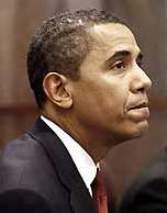The world simply would not tolerate America irresponsibly printing more money in order to save its economy. There's more than a hole in the bucket dear Obama, the Bush regime blew the bottom out and no amount of printing VALUELESS toilet paper money can save the situation.

Obama faces $10 trillion national debt
FACE REALITY! Any attempt to print-off reams of bills would meet with massive dumping of US assets by other nations that do not wish to be caught with massively devalued US bonds and bills.
As previously stated, the BRIC group of nations would probably form a stronger economic alliance; a model which other regions/nations would follow.
Faced with economic pariah status -- not even Mexico and Canada could afford to maintain ties with a tail-spinning US economy -- the USA would probably fragment into regions that could, over time, pull themselves by the bootstraps out of economic oblivion.
Banksters, Wall St rogues and Robber Barons have destroyed the world's largest economy and the numb, dumbed-down, America sheeple allow these criminals and gross incompetents to maintain their positions and non-performance related huge wages! Bernie '$50b' Madoff, the world's biggest fraudster continues to live in luxury -- only in America!
Dream on while you can, sheeple, a rude awakening awaits!
From the Telegraph:
The long-held assumption that US assets - particularly government bonds - are a safe haven will soon be overturned as investors lose their patience with the world's biggest economy, according to Willem Buiter.© 2009 Telegraph Media Group Limited
Professor Buiter, a former Monetary Policy Committee member who is now at the London School of Economics, said this increasing disenchantment would result in an exodus of foreign cash from the US.
The warning comes despite the dollar having strengthened significantly against other major currencies, including sterling and the euro, after hitting historic lows last year. It will reignite fears about the currency's prospects, as well as sparking fears about the sustainability of President-Elect Barack Obama's mooted plans for a Keynesian-style increase in public spending to pull the US out of recession.
Writing on his blog , Prof Buiter said: "There will, before long (my best guess is between two and five years from now) be a global dumping of US dollar assets, including US government assets. Old habits die hard. The US dollar and US Treasury bills and bonds are still viewed as a safe haven by many. But learning takes place."
He said that the dollar had been kept elevated in recent years by what some called "dark matter" or "American alpha" - an assumption that the US could earn more on its overseas investments than foreign investors could make on their American assets. However, this notion had been gradually dismantled in recent years, before being dealt a fatal blow by the current financial crisis, he said.
"The past eight years of imperial overstretch, hubris and domestic and international abuse of power on the part of the Bush administration has left the US materially weakened financially, economically, politically and morally," he said. "Even the most hard-nosed, Guantanamo Bay-indifferent potential foreign investor in the US must recognise that its financial system has collapsed."
He said investors would, rightly, suspect that the US would have to generate major inflation to whittle away its debt and this dollar collapse means that the US has less leeway for major spending plans than politicians realise.
http://www.telegraph.co.uk/finance/4125947/Willem-Buiter-warns-of-massive-dollar-collapse.html

by staff report via rialator 2009-01-07 18:33:32
After betting the farm, the Benz, the Rolex and the college fund, Congress is about to take another $800 billion economic stimulus gamble. But economists say it may be time for an intervention.
The federal budget deficit already is projected to reach an unheard of $1.2 trillion this fiscal year, and President-elect Barack Obama's economic stimulus package, under review by lawmakers, would only add to the deficit.
That's on top of a $700 billion financial rescue, a $17 billion auto bailout and the first $150 billion stimulus (that's the one approved right before the worst economic crisis since the Great Depression).
So where does it end?
Obama said Tuesday he anticipates "trillion-dollar deficits for years to come." But even the cascade of economists calling for a big package say the country cannot sustain such deficits much longer.
The national debt already has topped $10 trillion -- or $35,000 per person. And the bigger it gets, the more the country has to pay in interest every year.
"In the end, Beijing is gonna become Obama's banker," said Peter Morici, a University of Maryland business professor who testified at the auto industry hearings in November.
The prescriptions for establishing a long-lasting economic health are wide-ranging. But while the passage of Obama's stimulus might seem a foregone conclusion, some are warning that the president-elect and the new Congress had better invest this money wisely or be faced with the need for more and bigger stimulus packages in the future.
Morici, who thinks the standing stimulus pitch is already about $200 billion bigger than it needs to be, said the government must send money to infrastructure projects like roads, schools and Internet.
That is part of the plan, according to officials.
House Speaker Nancy Pelosi emphasized the infrastructure components of the recovery package Wednesday, saying, "This is not your grandfather's public works bill."
And Mark Zandi, chief economist at Moody's Economy.com, said at an economic forum in Washington on Wednesday that the package should focus on spending since projects like infrastructure yield more "bang for the buck" than tax cuts. But he said tax cuts should be part of the recovery package, something Obama has endorsed.
Morici, though, said the last stimulus package in February, which was heavy with tax rebates, proved that sending spurts of money to individuals does little to stimulate the economy and does not even guarantee that the money will be spent inside the country.
"(Obama is) not talking about fixing what's broken," he said. To ensure long-term health, Morici said, the government needs to prop up the banking system and close the trade deficit.
Ross Eisenbrey, vice president of the Economic Policy Institute, said there "simply is no alternative" to a large stimulus package.
But he said this should be the final rescue package and that once the economy starts to turn around, potentially in two years or so, it's time to start filling in the gaping budget hole.
"At some point, the economy will be growing again, and we'll be adding jobs," he said. "And at that point, we're going to have to raise taxes."
Eisenbrey said the tax increases will have to go hand-in-hand with spending reductions, specifically overseas. He, too, said the United States must reduce its trade deficit and stop sending so much income overseas.
"That's a fundamental thing that we have to change," he said.
The economists and lawmakers talking up the stimulus plan are taking a sober tone, assuring the public that the deficit spending is a short-term tactic.
Pelosi stressed the need for "fiscal discipline and long-term economic prosperity" in a written statement reacting to the deficit projections from the Congressional Budget Office.
Obama, too, promised long-term fiscal discipline Wednesday, while stressing that the government needs to run deficits in order to jump-start the economy in the short term and create three million jobs. Since falling tax revenues are contributing to the deficit, he said the government must take decisive action or "we will continue to see red ink as far as the eye can see." But he said his administration will address bringing the deficits to a "manageable level." He said entitlement programs will factor into that plan.
Harvard University economics professor Martin Feldstein, who spoke alongside Zandi at the economic forum, also said there needs to be an "exit strategy."
"The spending should not create a political dynamic that makes it hard to stop," he said.
But the projected $1.2 trillion deficit sets a benchmark, dwarfing last year's record of $455 billion. It's 8 percent of the GDP -- even the big deficits of the '80s and early '90s didn't approach that kind of percentage.
So there are skeptics to the pledges of fiscal responsibility.
Georgia Rep. Tom Price, incoming chairman of the conservative Republican Study Committee, told FOXNews.com he's not convinced the stimulus plan will actually stimulate.
"The record on this type of stimulus package is not good," he said. "The jury's still out on whether we can afford the deficits that we currently have in place, so putting any more deficits on top of the current one is irresponsible activity."
Price sided with Feldstein in saying permanent tax cuts, rather than one-time rebates, are the way to go, provided the government shrinks.
George Mason University economics professor Walter Williams said he has little faith the deficits will be contracting anytime soon.
"Unless you believe in Santa Claus or the tooth fairy, you have to ask the question, 'Where's Congress going to get that money from?'" he said of the stimulus. "It's like you have a swimming pool, and you try to increase the height of the shallow end by taking buckets out of the deep end. It's foolhardy."
FOXNews.com's Judson Berger contributed to this report.
© 2009 FOX News Network, LLC
http://www.foxnews.com/politics/2009/01/07/does-end-economists-warn-feeding-trillion-dollar-deficits/